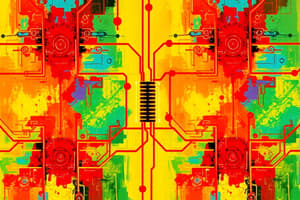Podcast
Questions and Answers
What condition must be satisfied for channel conduction in an enhancement type p-MOSFET?
What condition must be satisfied for channel conduction in an enhancement type p-MOSFET?
- vGS < Vt (correct)
- vGS = Vt
- vGS > Vt
- vGS is equal to zero
Which phenomenon causes channel length modulation in an enhancement nMOSFET?
Which phenomenon causes channel length modulation in an enhancement nMOSFET?
- Pinch off effect (correct)
- Gate oxide breakdown
- Substrate effect
- Avalanche breakdown
What parameter is inversely proportional to channel length L for an nMOSFET?
What parameter is inversely proportional to channel length L for an nMOSFET?
- λ (lambda) (correct)
- iD (drain current)
- Vt (threshold voltage)
- VDSat (saturation voltage)
In the context of a cMOS configuration, which statement is true regarding λn and |λp|?
In the context of a cMOS configuration, which statement is true regarding λn and |λp|?
Which of the following is NOT a secondary effect impacting the characteristics of a depletion type n-MOSFET?
Which of the following is NOT a secondary effect impacting the characteristics of a depletion type n-MOSFET?
What does r0 represent in the context of a large signal equivalent circuit model?
What does r0 represent in the context of a large signal equivalent circuit model?
Which characteristic of an nMOSFET describes the relationship between iD and vDS after saturation?
Which characteristic of an nMOSFET describes the relationship between iD and vDS after saturation?
What happens to the output resistance as channel length L increases?
What happens to the output resistance as channel length L increases?
What describes the primary function of a MOSFET?
What describes the primary function of a MOSFET?
What is the role of the gate terminal in the MOSFET operation?
What is the role of the gate terminal in the MOSFET operation?
Which of the following statements about the gate current in a MOSFET is true?
Which of the following statements about the gate current in a MOSFET is true?
What occurs when there is zero gate voltage (VGS = 0) in a MOSFET?
What occurs when there is zero gate voltage (VGS = 0) in a MOSFET?
In which stage does the positive gate voltage lead to the formation of a conduction channel in an n-MOSFET?
In which stage does the positive gate voltage lead to the formation of a conduction channel in an n-MOSFET?
What is the typical range for the length (L) of the conduction channel in a MOSFET?
What is the typical range for the length (L) of the conduction channel in a MOSFET?
Which characteristic describes the source and drain regions in an n-MOSFET?
Which characteristic describes the source and drain regions in an n-MOSFET?
Which of the following applications do MOSFETs play a critical role in?
Which of the following applications do MOSFETs play a critical role in?
What is the output current IDn when vi = 0 volts?
What is the output current IDn when vi = 0 volts?
When vi = +2.5 volts, what is the state of the p-channel MOSFET?
When vi = +2.5 volts, what is the state of the p-channel MOSFET?
What indicates the n-channel MOSFET is operating in saturation mode?
What indicates the n-channel MOSFET is operating in saturation mode?
What is the output voltage vo when vi = -2.5 volts, given symmetrical properties?
What is the output voltage vo when vi = -2.5 volts, given symmetrical properties?
In the scenario where vi = +2.5 volts, what is the value of VGS,n-channel?
In the scenario where vi = +2.5 volts, what is the value of VGS,n-channel?
What parameter indicates both transistors are in conduction mode at vi = 0 volts?
What parameter indicates both transistors are in conduction mode at vi = 0 volts?
What is the equation for IDn when vi = +2.5 volts?
What is the equation for IDn when vi = +2.5 volts?
What is the threshold voltage for both n-channel and p-channel MOSFETs as given?
What is the threshold voltage for both n-channel and p-channel MOSFETs as given?
What is the threshold voltage (Vtn) given for the n-channel MOSFET?
What is the threshold voltage (Vtn) given for the n-channel MOSFET?
If the drain current (ID) is assumed to be 0.89 mA and calculated VS is greater than 5 volts, what does this indicate?
If the drain current (ID) is assumed to be 0.89 mA and calculated VS is greater than 5 volts, what does this indicate?
What value of ID satisfies the equation for the saturation mode in the first case?
What value of ID satisfies the equation for the saturation mode in the first case?
What does the overdrive voltage (VOV) represent in the context of the n-channel MOSFET?
What does the overdrive voltage (VOV) represent in the context of the n-channel MOSFET?
Which of the following is true regarding the complementary MOSFET configuration?
Which of the following is true regarding the complementary MOSFET configuration?
What is the output voltage when the drain current ID is determined to be 0.5 mA for the n-channel MOSFET?
What is the output voltage when the drain current ID is determined to be 0.5 mA for the n-channel MOSFET?
Which of these values acts as the determining factor to confirm the saturation region assumption for the n-channel MOSFET?
Which of these values acts as the determining factor to confirm the saturation region assumption for the n-channel MOSFET?
In the complementary MOSFET analysis mode, what is the biasing setup based on?
In the complementary MOSFET analysis mode, what is the biasing setup based on?
At what point is channel conduction initiated in a MOSFET?
At what point is channel conduction initiated in a MOSFET?
What is the condition for conduction to occur in a MOSFET?
What is the condition for conduction to occur in a MOSFET?
What is the formula for the magnitude of the electron charge in the channel?
What is the formula for the magnitude of the electron charge in the channel?
What happens to the drain current iD when vDS increases beyond VDSat?
What happens to the drain current iD when vDS increases beyond VDSat?
Flashcards are hidden until you start studying
Study Notes
MOSFET Overview
- Three-terminal device: controls current through two terminals via voltage at the third.
- Functions both as an amplifier and a switch.
- Ideal for VLSI technology, enabling billions of MOSFETs on a single IC chip.
- Crucial in mixed signal IC applications: amplifiers, filters, memory circuits, digital switches.
- Developed from field effect transistor concepts proposed by William Shockley at Bell Labs in 1952.
Structural Basics
- Enhancement type n-MOSFET:
- Extremely small gate current, around femtoamperes (fA).
- Symmetrical source and drain regions remain reverse biased.
- Typical channel length (L) ranges from 0.03 to 1 μm and channel width (W) from 0.05 to 100 μm.
MOSFET Operation Stages
-
Stage 1: Zero Gate Voltage
- No conduction channel exists; no current flows.
-
Stage 2: Positive Gate Voltage
- Conduction channel forms when VGS reaches threshold voltage (Vt).
- Conduction occurs when vGS > Vt or an overdrive voltage (vOV = vGS - Vt) exists.
- Charge in the channel: |Q| = COX(WL)vOV, with COX being the oxide capacitance.
-
Stage 3: Small VDS
- Constant VGS maintains charge (Q) in the channel unchanged.
- Relevant equations characterize drain-to-source current flow.
-
Stage 4: Increasing VDS
- Voltage drop across the channel; potential shifts from Vt + vOV at the source to the drain.
- Drain current (iD) increases non-linearly with vDS.
-
Stage 5: Saturation Zone
- Channel pinch-off occurs; further increases in vDS stabilize iD.
- Saturation current is defined when vDS reaches saturation voltage (VDSat).
Circuit Characteristics and Symbols
- MOSFET circuit symbols depict n-MOSFET and p-MOSFET configurations.
- Relationships described by iD-vDS and iD-vGS characteristics.
- The large-signal equivalent circuit model illustrates operation in saturation.
New Concepts in MOSFETs
- Channel length modulation is an effect observed in saturation.
- Finite output resistance (r0) and its dependency on channel length (L) analyzed.
- λ (channel length modulation parameter) inversely related to channel length.
Depletion Type n-MOSFET
- Can operate in both depletion and enhancement modes.
- Secondary effects to consider:
- Temperature impact on Vt and transconductance.
- Avalanche breakdown with higher vDS.
- Gate oxide breakdown due to increased vGS.
- Velocity saturation of carriers in short channels.
- Body (substrate) effect with differing substrate potential.
Operational Zones in MOSFET Circuits
- Assume saturation operation unless stated otherwise, then verify conductance conditions.
Example Case Analyses
-
Case 1: n-Channel MOSFET
- Given parameters to perform analysis including threshold voltage (Vtn).
- VGS and ID calculations lead to verification of saturation assumptions.
-
Case 2: Complementary MOSFET
- Biasing arrangement integrated for proper analysis of n-channel and p-channel components.
- Symmetrical characteristics yield drain current calculations and operational mode checks.
Final Notes
- Apply the concepts of MOSFET saturation, linear, and triode zones in real-world circuit analysis.
- Understanding the operation stages enhances feasibility in designing and applying MOSFETs effectively in various circuits.
Studying That Suits You
Use AI to generate personalized quizzes and flashcards to suit your learning preferences.




